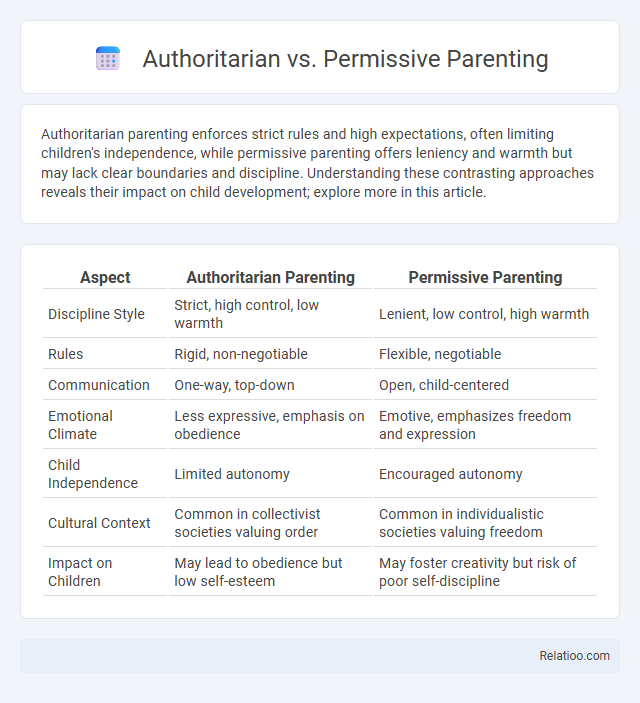Authoritarian parenting enforces strict rules and high expectations, often limiting children's independence, while permissive parenting offers leniency and warmth but may lack clear boundaries and discipline. Understanding these contrasting approaches reveals their impact on child development; explore more in this article.
Table of Comparison
| Aspect | Authoritarian Parenting | Permissive Parenting |
|---|---|---|
| Discipline Style | Strict, high control, low warmth | Lenient, low control, high warmth |
| Rules | Rigid, non-negotiable | Flexible, negotiable |
| Communication | One-way, top-down | Open, child-centered |
| Emotional Climate | Less expressive, emphasis on obedience | Emotive, emphasizes freedom and expression |
| Child Independence | Limited autonomy | Encouraged autonomy |
| Cultural Context | Common in collectivist societies valuing order | Common in individualistic societies valuing freedom |
| Impact on Children | May lead to obedience but low self-esteem | May foster creativity but risk of poor self-discipline |
Understanding Parenting Styles: Authoritarian vs Permissive
Authoritarian parenting emphasizes strict rules, high demands, and limited warmth, often leading to obedient but less socially skilled children, while permissive parenting features high responsiveness and low demands, which can result in children struggling with self-discipline. Understanding these contrasting parenting styles is crucial for optimizing child development, as authoritarian approaches may inhibit autonomy and permissive methods may reduce accountability. Effective child-rearing practices balance structure with support to foster emotional regulation and social competence.
Key Characteristics of Authoritarian Parenting
Authoritarian parenting is characterized by high demands and strict rules with little warmth or flexibility, emphasizing obedience and discipline over open communication. Parents adopting this style often use punishment over reasoning and expect unquestioning compliance from their children. Your child may struggle with self-esteem and social skills due to the lack of emotional support and autonomy in their upbringing.
Defining Features of Permissive Parenting
Permissive parenting is defined by low demands and high responsiveness, where parents set few rules and allow considerable freedom, often avoiding confrontation or discipline. This style emphasizes nurturing and communication but may lead to a lack of structure, resulting in children exhibiting impulsive or non-compliant behavior. Characteristic behaviors include warm, accepting attitudes combined with inconsistent enforcement of boundaries and limited guidance in child-rearing practices.
Communication Patterns in Both Parenting Styles
Authoritarian parenting typically features one-way communication where parents enforce strict rules and expect obedience without explanation, limiting children's verbal expression and emotional sharing. Permissive parenting encourages open dialogue and emotional freedom, resulting in more bidirectional communication where children feel comfortable expressing needs and opinions. Effective child-rearing practices balance clear expectations with responsive communication, fostering healthy emotional development and mutual understanding.
Effects on Child Behavior and Development
Authoritarian parenting often leads to children exhibiting obedience but may struggle with self-esteem and social skills, while permissive parenting tends to result in children who are more impulsive and have poor self-discipline. Balanced child-rearing practices that combine consistent boundaries with emotional support promote healthier emotional regulation and social competence. Your approach to parenting significantly influences your child's behavioral development and long-term psychological well-being.
Discipline Approaches: Strictness vs Leniency
Authoritarian parenting emphasizes strict discipline with rigid rules, expecting unquestioned obedience, while permissive parenting adopts a lenient approach, allowing children significant freedom with minimal enforcement of rules. Child-rearing practices vary widely, but balancing firmness and warmth fosters better emotional regulation and social competence in children. Understanding your child's temperament helps tailor discipline approaches that promote healthy development without excessive strictness or permissiveness.
Emotional Outcomes for Children
Authoritarian parenting, characterized by strict rules and high expectations, often leads to children experiencing higher levels of anxiety and lower self-esteem. Permissive parenting, marked by leniency and few boundaries, can result in children struggling with self-discipline and emotional regulation. Understanding how your child-rearing practice influences emotional outcomes helps you foster resilience, empathy, and emotional stability in your child's development.
Long-Term Consequences of Each Parenting Style
Authoritarian parenting often leads to children exhibiting lower self-esteem, increased anxiety, and difficulties in social competence due to its strict rules and lack of warmth. Permissive parenting may result in poor self-discipline, impulsivity, and higher risk of behavioral problems because of the inconsistent boundaries and leniency. Balanced child-rearing practices that combine appropriate control with emotional support promote healthier psychological development and better long-term emotional regulation.
Cultural Influences on Parenting Choices
Cultural influences significantly shape your parenting choices by determining whether authoritarian or permissive child-rearing practices are emphasized within a community. Authoritarian parenting, often prevalent in collectivist cultures, values obedience and strict discipline to maintain family harmony, while permissive parenting, more common in individualistic societies, encourages freedom and self-expression in children. Understanding these cultural contexts helps explain the diverse approaches to child-rearing and their impact on child development and social behavior.
Finding a Balanced Approach to Effective Parenting
Authoritarian parenting emphasizes strict rules and obedience, often leading to limited child autonomy, while permissive parenting offers high responsiveness but low discipline, risking behavioral issues due to a lack of boundaries. Effective child-rearing practice involves integrating clear expectations with emotional support to promote self-regulation and social competence. Research highlights that balanced parenting, characterized by consistent discipline combined with warmth, fosters optimal developmental outcomes and resilience in children.

Infographic: Authoritarian vs Permissive parenting
 relatioo.com
relatioo.com